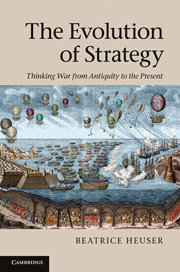Book contents
- Frontmatter
- Contents
- Acknowledgements
- A note on referencing
- Part I Introduction
- PART II Long-term constants
- 2 Warfare and mindsets from Antiquity to the Middle Ages
- 3 Warfare and mindsets in early modern Europe
- 4 Themes in early thinking about Strategy
- PART III The Napoleonic paradigm and Total War
- PART IV Naval and maritime Strategy
- PART V Air Power and nuclear Strategy
- PART VI Asymmetric or ‘small’ wars
- PART VII The quest for new paradigms after the World Wars
- Bibliography
- Index
3 - Warfare and mindsets in early modern Europe
from PART II - Long-term constants
Published online by Cambridge University Press: 05 June 2012
- Frontmatter
- Contents
- Acknowledgements
- A note on referencing
- Part I Introduction
- PART II Long-term constants
- 2 Warfare and mindsets from Antiquity to the Middle Ages
- 3 Warfare and mindsets in early modern Europe
- 4 Themes in early thinking about Strategy
- PART III The Napoleonic paradigm and Total War
- PART IV Naval and maritime Strategy
- PART V Air Power and nuclear Strategy
- PART VI Asymmetric or ‘small’ wars
- PART VII The quest for new paradigms after the World Wars
- Bibliography
- Index
Summary
It seems to me to be imprudence to commit the fortune of a state to the event of a general battle where the fate of arms is always uncertain and dangerous.
(Hay du Chastelet 1668/1757: 112)Causes, aims, and practice of war in early modern Europe
Religion would ultimately recede in the thinking of early modern authors, but not before divisions within Christendom had been a major cause for two centuries of wars. This element was present, as we have seen, in the medieval persecutions of heretics. In the sixteenth century, it would tear the Holy Roman Empire and the Habsburg lands apart, as well as France and, on a lesser scale, England, and it would be a major factor in the Thirty Years War. But other drivers for war known to the Middle Ages equally persisted.
The culture of early modern European elites, like that of their medieval predecessors, saw warfare primarily as an opportunity to win glory and renown, and the means to claim and to defend property where courts did not exist or would not arbitrate in their favour. The entire political system of early modern Europe consisted of volatile alliances between thoroughly selfish dynasties, who by marriage, inheritance or war sought to amass for themselves as much territory, wealth and subjects as possible (Black 1987: 20–2). The utterly self-serving nature of these dynasties’ politics was mitigated by religious factors, which at the time occupied the place filled by ideology in the twentieth century. Speaking not only of princely dynasties, Niccolò Machiavelli and, echoing him, Raymond Beccarie de Pavie, sieur de Fourquevaux (1508–74) opined that ‘men do sooner forget the deaths of their father, then the loss of theyr patrimony’ (Machiavelli 1532b/1961: 97; Fourquevaux 1549: 260).
- Type
- Chapter
- Information
- The Evolution of StrategyThinking War from Antiquity to the Present, pp. 54 - 75Publisher: Cambridge University PressPrint publication year: 2010



